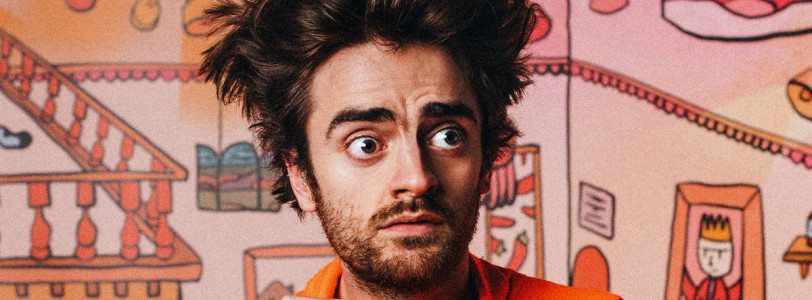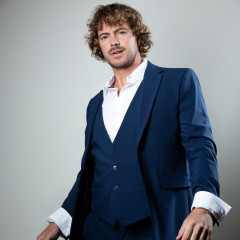Could you first introduce yourself to the reader?
Dear Reader. I am Luke Rollason. I am a physical comedian who makes nice shapes with his body for entertainment purposes.
How would you describe your show?
I would describe it as a surreal house tour from a friend you’re worried about, that feels like a cross between Home Alone and Toy Story, if the kid from Home Alone lived in IKEA and really really wanted to be robbed and was so desperate to be robbed that he brought his furniture and useless utensils to life so that they could bully him.
In this version of Home Alone, the kid loses. I am the real-life adult Macaulay Culkin.
Why do you want to perform at Edinburgh Festival Fringe?
Because even though it is the most high-pressure month of a comedian’s calendar, and produces months of anxiety, comparison and sheer terror in the lead-up, its still this amazingly unpredictable environment. My favourite experiences watching theatre and comedy have taken place at the Fringe, but what makes it worth going to year on year are the strange encounters, coincidences and frankly weird places you end up in that fill all the time between the shows and the stress. It is a place where anything can happen and most of it is really weird. It’s the perfect context for my work.
What differentiates it from other festivals?
Size and self-importance. It means for a whole month you have so much in common – much of it miserable – with almost all of your friends and peers in the industry, as well as thousands of total strangers. It’s a huge, expensive and frighteningly powerful bonding experience.
What first motivated you to enter the industry? Who were your inspirations?
I was really inspired by solo artists who were creating beautiful, moving and utterly stupid work – work that, without a gigantic budget, totally surpassed big budget theatre productions as a feast for the imagination. Trygve Wakenshaw’s Squidboy was the first show to make me feel this way. It totally opened my eyes up to mime as a medium for getting the audience to imagine your show into being. It’s why I love what I do – each show feels like a one-off imaginative collaboration.
How has your background, upbringing and education had an impact on your artistic career?
I’m the youngest child of a middle class family, from parents who were the first of their families to go to university. Meaning I had the ideal cocktail of A) parents who wanted their children to have the opportunities that they didn’t growing up, with B) absolutely none of the pressure of being the first or second child to be offered that smorgsboard of possibility. I had the freedom to gloriously squander the education I was given. There is no other explanation for my minor success. I am a talentless squib who would have floundered with anything less.
There’s a lack of diversity within alternative comedy, which I think is primarily down to its much smaller scale than more mainstream forms of comedy. If you scale down any industry, you get a microcosm of the same ratio, but it is far more blatant in a much smaller pool of talent. But also because it is perceived to be less financially viable in the long term.
And comedy already has far fewer bursaries or industry awards supporting emerging talent – it’s kind of a free-for-all. Theoretically this is why I set up the Luke Rollason Memorial Bursary at the Brighton Fringe this year, to support alternative comedians from underrepresented backgrounds to bring work to the festival. I’d love to set it up at Edinburgh next year as well, because frankly it's fantastic marketing for my work. Who cares about philanthropy, I just want people to think nice things about me. All I have to do is not die in the meantime.
What is your earliest childhood art memory?
Probably being made to wear giant shirts backwards to do fingerpainting in primary school art class. There’s something subliminal that appeals to me there – a gateaway acceptance of the illogical and unusual before you can even start work. I was rubbish at art, and I still am (despite making all my props myself) but I love that the gateway to the subject is doing something wrong immediately.
If you didn’t have your current job, what would you probably be doing?
I would probably still be trying to make my friends laugh, but I wouldn’t be charging them for the privilege. Or maybe I’d be applying the pay-what-you-want model to more of my everyday interactions, rather than saving it all up for one big blowout in August every year. At least this way by September I’ve gotten it out of my system.
Did Covid-19 change the way you create work? Do you approach shows with a different mentality now?
I used to create shows on a totally manic scale – there was one Brighton Fringe where me and my two best friends (Tom Penn and Christian Brighty) performed six different shows across the entire month. Most people do one show, for three days, maximum. I used to have so many different live projects on the go at once – and I miss doing this, because it allows for such a breadth of experimentation. But with fewer performance opportunities swimming around, and relying more on not-live work for income and career progression stuff, it feels more logical to do fewer shows with more care. And to hopefully have more time off. I am really bad at taking breaks.
Describe the last year in 5 words or less?
Two thousand and twenty two.
Do you subscribe to the idea that art should be exempt from ‘cancel culture’?
Art is the coalface of cultural debate. So to claim it should get a free pass from engaging with the conversation is absolutely mad. It just doesn’t, sadly. The conversation is mostly about art. If art is “exempt” from whatever it is that we are calling “cancel culture”, then what the hell isn’t?
There’s not much I can add to this debate that hasn’t been articulated better elsewhere. But to be concise – it feels that when we talk about cancel culture, what we are really talking about is (for example) comedians facing a much wider audience than perhaps they are accustomed to, and facing the consequences of that. Some people will not like what you have to say (or mime, in my case). In many cases, when someone claims to be cancelled, either A) they have committed crimes, or B) they are complaining about people who don’t agree with them to a group of people who do agree with them. The bogeyman of the “wokeflakes” and “cancel culture” feel like consolation for people who are discovering that not everyone on the entire planet loves them. But there are still plenty of people who do, and who agree with them that “cancel culture” has “got out of hand.” It feels like we are finding a cultural shorthand for how, in a global audience, a piece of work doesn’t receive one homogenous response. But somehow for many people this comes as a surprise.
If you could work with anybody, from any point in history, who would you pick and why?
I would like to be working with Jim Henson, but with both of us transplanted to medieval England. I’d like to see what he’d do within those limitations. I think we would make a really creative turnip marionette pageant for the coronation or something.
What advice would you give to someone who wants to take a show up to the fringe?
Any advice you read in a Fringe Q+A will be ultimately completely irrelevant to you.
When and where can people see your show?
I’m performing at Monkey Barrel: The Hive at 12.30pm every day from the 3rd – 28th August, except on the 10th and the 17th. I’ve given myself two days off to make up for taking no holidays the rest of the year.
And where can people find, follow and like you online?
You can follow me on Instagram @lukerollasonisaclown and Twitter @LukeRollason.
See Luke Rollason: Bowerbird at the Monkey Barrel during the Edinburgh Festival Fringe from 3-28 August. For more information and tickets visit www.edfringe.com or www.monkeybarrelcomedy.com









0 Comments